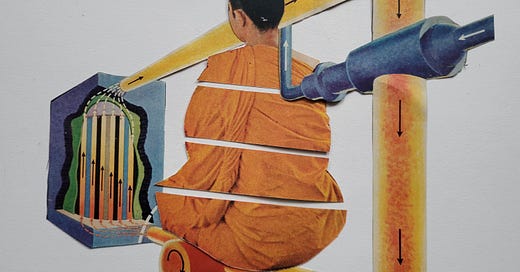E33. Lou Reed's Nephew on Wisdom
‘Everything will work out in the end,’ is an ironclad, if misleading, promise to yourself.”
“Everything will work out in the end.”
“You really believe that?” I asked Lou Reed’s Nephew, who had just let this banality slip from his lips.
“It’s a figure of speech,” he said. “And it is true. Just not in the way people think.”
“Explain.”
“Well, it is the case that if you are alive in the future, looking back, everything that happened before will form part of a story in which you are still alive, so—from that perspective—everything will have worked out. ‘Everything will work out in the end,’ is an ironclad, if misleading, promise to yourself.”
“I don’t follow.”
Lou Reed’s Nephew rolled his eyes.
“At every point in the future, you will either be alive or dead.”
“Correct.”
“If you are alive and recall a point in the past when you affirmed the proposition ‘everything will work out in the end,’ that affirmation will appear to have been true. But if you are dead, you won’t be around to perform the test that reveals the statement to be false.”
“I see. The statement is true, but only because all witnesses against it are dead.”
“Exactly. It’s like evolution. The jury is stacked with things that continue to exist, which—even in their darkest hours—testify to the goodness of the process that has allowed them to do so. But most things that have ever existed, the extinct, are barred from the courtroom.”
“Where did you learn such tragic wisdom?”
“Atlanta,” he said. “I got stuck in the airport there on the way back from the Indian Poker tournament. These Atlanta people were new to me. So different from the people on the subways. They were not uncomfortable or grasping. The women and children wore pajamas and sprawled across the floors and public art as if they were in their own beds. I have never seen such self-acceptance. My flight was only delayed a few hours, but I decided to miss it. I spent two days and nights in the Atlanta airport, watching.
“The next morning, the place was flooded with business travelers. Hundreds of them, all in pairs. They carried backpacks covered in logos and lanyards hung around their necks. At first, I thought they were part of the same group—a conference maybe—but I realized, slowly, that their uniformity stemmed from a shared purpose. They were comfortable and unhealthy. The men wore golf shirts and mustaches and no socks inside their tasseled loafers.”
I noted that Lou Reed’s Nephew had been trying, unsuccessfully, to let the hair on his upper lip grow, though he had only managed the appearance of crumbs. He had swapped his oxfords for golf shirts, though I’d assumed this was because it was summer.
“They travel in pairs, like missionaries, in dyads composed of an ‘account executive’ and something called a ‘sales engineer.’ They travel the country, always via the Atlanta airport, explaining ‘solutions’ to people who are mostly not interested in them or don’t understand them or have agreed to talk about them only because their bosses received an automated email and were told to ‘check it out.’ The work of these pilgrims is so self-effacing, so meaningless, I have not seen its humility rivalled, before or since.
“Yet they were not consumed by despair or morbid reflection. They seemed completely at ease—guzzling diet soft drinks and bite-sized cinnamon buns—as they went about this work, of which they would never see the fruits. I watched them come and go for thirty-six whole hours, fascinated by the selflessness that allowed them to go about their dreary business. I grew up detesting people like this. The jocks and gym coaches. But as I observed them, I developed a new appreciation for these beer-bellied sages. Could they be the prophets among us? They never went on pilgrimages to India, or even the gym, because they were already whole and unspectacularly complete. Forget your self-help gurus and the neighborhood yogini. Forget the baby-faced entrepreneurs with their world-changing ideas. They stand apart. Their egos are fed. Instead, admire these anonymous cogs, silently set—like glittering jewels—in the rows of Comfort+.”
I wasn’t sure if Lou Reed’s Nephew was pulling my leg. I was never sure. It was a radical message, in its way. I could imagine it speaking to Lou Reed’s Nephew’s newfound success and to the legions of customer success managers in his feeds. Maybe he was right, or maybe Lou Reed’s Nephew was on his way to becoming an illustrious failure all his own.
“I was able to learn some of their sayings,” he continued. “‘Everything will work out in the end,’ was one of them. And they have a prayer of sorts, the only solid evidence of the spiritual mastery these men have hidden so carefully beneath their thick veneer of mediocrity.
“Whenever two meet, one asks the other how he is doing, and the other always responds in the same way.
“‘Living the dream,’ he says. ‘I’m just living the dream.’’”




